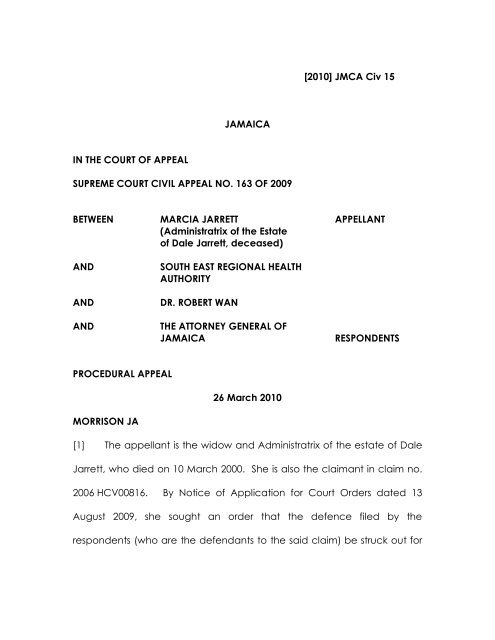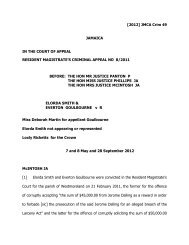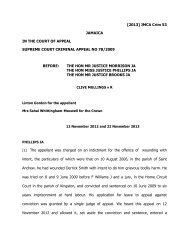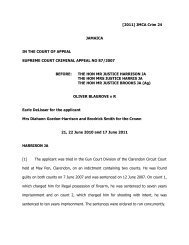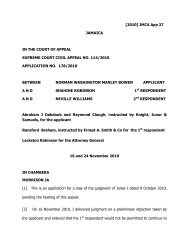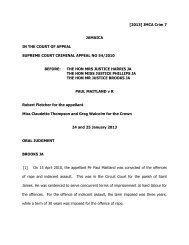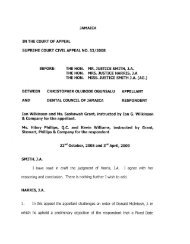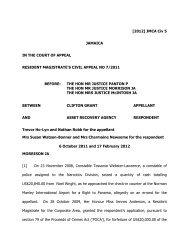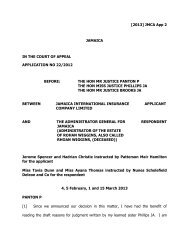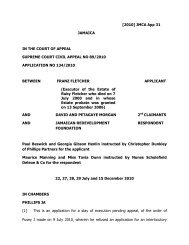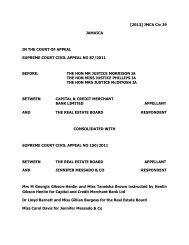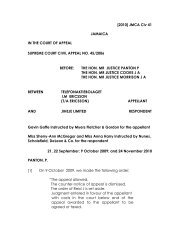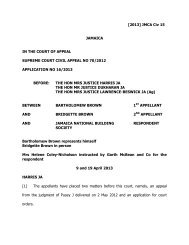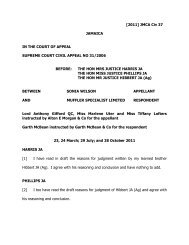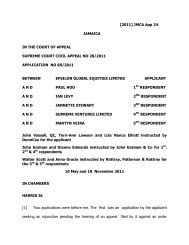Jarrett _Marcia_ v South East Regional Health Authority et al.pdf
Jarrett _Marcia_ v South East Regional Health Authority et al.pdf
Jarrett _Marcia_ v South East Regional Health Authority et al.pdf
- No tags were found...
You also want an ePaper? Increase the reach of your titles
YUMPU automatically turns print PDFs into web optimized ePapers that Google loves.
absence of any affidavit from Dr Wan explaining this gap, the appellantsubmits that there has clearly been a breach of the order for specificdisclosure and that she was as a result entitled to an order striking out thestatement of defence, pursuant to rule 28.14 (2) of the Civil ProcedureRules 2002 (“the CPR”).[14] The respondents for their part submit that the appellant’s pleadedclaim “is restricted to <strong>al</strong>legations of negligence about the treatment andcare of [the deceased] under the aegis of the Crown, not when heconsulted Dr Wan in his private practice.” Their further submission is thatthe Attorney Gener<strong>al</strong>’s response is to the claim as it relates to Dr Wan in hiscapacity as agent or servant of the Crown and that the Attorney Gener<strong>al</strong>no control “of any document used or generated by Dr Wan in his privatepractice and therefore cannot disclose same”. The respondents contendthat because the appellant’s <strong>al</strong>legations of negligence centre around theperiod March 1999 to March 2000, “it cannot be said that any documentgenerated by or in Dr Wan’s possession in respect of [the deceased] thatexisted before March 1999, can be said to adversely affect theDefendant’s case or tends to support the Claimant’s case”, or that anysuch document would be directly relevant to matters in issue in theproceedings.
[15] The respondents <strong>al</strong>so refer to the provisions of the CrownProceedings Act, to make the point that the Crown can only be heldliable for the acts or omissions of its servants or agents <strong>al</strong>legedlycommitted during the course of their duties. In those circumstances, sothe submission goes, the acknowledgment of service of the claim formand particulars of claim on beh<strong>al</strong>f of <strong>al</strong>l the respondents “is in respect of[Dr Wan] as crown servant and not in his private capacity.” As a result,“The Crown is therefore constrained by its unique statutory position to notdisclose the private records of Dr Wan”, and that, when the Director ofState Proceedings acknowledges service of proceedings, “he does so onbeh<strong>al</strong>f of the Crown and in respect of any tort <strong>al</strong>legedly committed by acrown servant and/or agent.”[16] The respondents refer to and rely on Part 28 of the CPR, which de<strong>al</strong>swith disclosure and inspection of documents. The scope of a party’s basicduty of disclosure is stated in rule 28.2 as follows:“(1) A party’s duty to disclosure documents islimited to documents which are or havebeen in the control of that party.(2) For this purpose a party has or has hadcontrol of a document if:(a)(b)it is or was in the physic<strong>al</strong> possessionof that party;that party has or has had a right topossession of it; or
(c) that party has or has had a right toinspect or take copies of it.”[17] Rule 28.4(1) provides that, where a party is required by any directionof the court to give standard disclosure, “that party must disclose <strong>al</strong>ldocuments which are directly relevant to the matters in question in theproceeding”, while rule 28.6 provides for specific disclosure, as follows:“(1) An order for specific disclosure is an orderthat a party must do one or more of thefollowing things-(a) disclose documents or classes ofdocuments specified in the order; or(b) carry out a search for documents tothe extent stated in the order and discloseany documents located as a result of thatsearch.(2) An order for specific disclosure may bemade on or without an application.(3) An application for specific disclosure maybe made without notice at a casemanagement conference.(4) An application for specific disclosure mayidentify documents-(a) by describing the class to which theybelong; or(b)In any other manner.(5) An order for specific disclosure may requiredisclosure only of documents which aredirectly relevant to one or more matters inissue in the proceedings.”
[18] The procedure for disclosure is provided for in rule 28.8 (by themaking and serving by each party of a list of documents) and rule 28.9obliges the attorney-at-law for each party to explain to the maker of a listof documents (and to certify that this has been done) the necessity for fulldisclosure and the possible consequences of failing to so. Rule 28.10obliges the maker of the list similarly to certify that he understands the dutyof disclosure and that to the best of his knowledge it has been carried out.[19] The consequences of failure to disclose documents under an orderfor disclosure are s<strong>et</strong> out in rule 28.14, as follows:“(1) A party who fails to give disclosure by thedate ordered or to permit inspection maynot rely on or produce any document notso disclosed or made available forinspection at the tri<strong>al</strong>.(2) A party seeking to enforce an order fordisclosure may apply to the court for anorder that the other party’s statement ofcase or some part of it be struck out.(3) An application under paragraph (2)relating to an order for specific disclosuremay be made without notice but must besupported by evidence on affidavit thatthe other party has not complied with theorder.(4) The gener<strong>al</strong> rule is that the court will de<strong>al</strong>with such an application withoutattendance but the court may-(a)require the applicant to attend tosupport the application; or
(b)direct that a hearing be fixed andthat notice of the date, time andplace of such hearing be given tothe respondent.(5) On an application under paragraph 920the court may order that unless the party indefault complies with the order fordisclosure by a specific date that party’sstatement of case or some part of it bestruck out.”[20] In this case, Cole-Smith J’s order for specific disclosure required therespondents to disclose the deceased’s medic<strong>al</strong> records in theirpossession, without limitation or qu<strong>al</strong>ification.Each party, including DrWan, as a named party to the suit, is under an equ<strong>al</strong> obligation to complywith order for disclosure. Even from the argument put forward in this courton beh<strong>al</strong>f of respondents, it is clear that Dr Wan has not complied with theorder for disclosure as it relates to his treatment of the deceased in hisprivate practice. It appears to me to be the clear duty of the Director ofState Proceedings, as the attorney-at-law on the record for <strong>al</strong>l threerespondents, including Dr Wan, to advise them of the need to complywith the order for specific disclosure.[21] I am therefore not at <strong>al</strong>l attracted to the argument put forward bythe Director that “it is unreasonable and impractic<strong>al</strong> in the circumstancesfor the Crown to be responsible for specific disclosure.” In so far as theorder relates to Dr Wan, it is not the Crown (or, indeed, the Director) who is
esponsible for compliance, it is Dr Wan himself. It was fully open to DrWan to have privately engaged attorneys to represent him in this matter(indeed, this is a course that remains open to him), but his havingappointed the Director to act for him does not in any way affect orreduce the scope of the duty of disclosure which the rules impose uponhim.[22] Nor am I any more taken by the submission that, the claim beingrestricted “to <strong>al</strong>legations of negligence about the treatment and care of[the deceased] under the aegis of the Crown, not when he consulted DrWan in his private practice”, any documentary materi<strong>al</strong> in the possessionor control of Dr Wan cannot therefore be “directly relevant” to any issue inthe proceedings. Even under the basic rules of discovery as they existedbefore the CPR came into force in 2003, it was the law that, as Br<strong>et</strong>t LJstated the position in Compagnie Financiere <strong>et</strong> Commerci<strong>al</strong> de Pacifiquev Peruvian Guano Co. (1882) 11 QBD 55, 63, “every document relates tothe matters in question in the action, which not only would be evidenceupon any issue, but <strong>al</strong>so which, it is reasonable to suppose, containsinformation which may - not which must - either directly or indirectlyenable the party requiring [discovery] either to advance his own case orto damage the case of his adversary.”
[23] This long established principle finds modern expression in rule 28.1(4)of the CPR which provides as follows:“For the purpose of this Part a document is‘directly relevant’ only if –(a)(b)(c)the party with control of the documentintends to rely on it;it tends to adversely affect that party’scase; orit tends to support another party’s case.”[24] It seems to me therefore that it is not for Dr Wan or his leg<strong>al</strong> advisorsto d<strong>et</strong>ermine degrees of relevance in the face of an order for disclosureas specific and as unqu<strong>al</strong>ified as that made by Cole Smith J in the instantcase. To the contrary, it is their duty to comply by preparing and serving <strong>al</strong>ist of documents, evenif it is intended to claim a right to withholddisclosure or inspection of a particular document by use of the procedures<strong>et</strong> out in rule 28.15 of the CPR (save only for cases in which a party wishesto apply to the court for permission not to disclose the existence of adocument on the ground that disclosure would damage the publicinterest, which does not arise in the instant case – see rule 28.15(2) – (8)).[25] I have not lost sight of Lord Diplock’s well known note of caution (inHadmor Productions Ltd v Hamilton [1983] 1 AC 191) that, on an appe<strong>al</strong>from the exercise by a judge of a discr<strong>et</strong>ion, it is no part of the court’sfunction to seek to exercise an independent discr<strong>et</strong>ion of its own. Rather,
the court must defer to the judge’s exercise of his discr<strong>et</strong>ion and must notinterfere with it merely because it would have exercised the discr<strong>et</strong>iondifferently:“The function of the appellate court is initi<strong>al</strong>ly oneof review only. It may s<strong>et</strong> aside the judge’sexercise of his discr<strong>et</strong>ion on the ground that it isbased upon a misunderstanding of the law or ofthe evidence before him or upon an inferenc<strong>et</strong>hat particular facts existed or did not exist,which, <strong>al</strong>though it was one that mightlegitimately have been drawn upon theevidence that was before the judge, can bedemonstrated to be wrong by further evidenc<strong>et</strong>hat has become available by the time of theappe<strong>al</strong>; or upon the ground that there has beena change of circumstances after the judgemade his order that would have justified hisacceding to an application to vary it. Sincereasons given by judges for granting or refusing[interim] injunctions may som<strong>et</strong>imes be sk<strong>et</strong>chy,there may <strong>al</strong>so be occasion<strong>al</strong> cases where eventhough no erroneous assumption of law of factcan be identified the judge’s decision to grant orrefuse the injunction is so aberrant that it must bes<strong>et</strong> aside upon the ground that no reasonablejudge regardful of his duty to act judici<strong>al</strong>ly couldhave reached it. It is only if and after theappellate court has reached the conclusion thatthe judge’s exercise of his discr<strong>et</strong>ion must be s<strong>et</strong>aside for one or other of the reasons, that itbecomes entitled to exercise an origin<strong>al</strong>discr<strong>et</strong>ion of its own.”[26] However, in the instant case I am clearly of the view that Beckford Jfell into error when she declined to entertain the appellant’s applicationunder rule 28.14(2), and thereby rendered the respondents’ application
for relief from sanctions otiose, as the judge described it. It seems to m<strong>et</strong>hat in accepting the respondents’ argument that the order for specificdisclosure made by Cole-Smith J “does not speak to specific disclosure orrecords in the possession of [Dr Wan] as a private practitioner from theperiod of December 1998 to March 1999”, Beckford J clearlymisunderstand the import of the order in the light of the rules, and that herorder must therefore be s<strong>et</strong> aside.[27] Rule 28.14(4) provides that upon an application for a strike-out orderfor failure to comply with an order for disclosure the court may make an‘unless’ order; that is, an order that unless the defaulting party complieswith the order for disclosure by a specific date, that party’s statement ofcase or some part of it may be struck out.On this basis, it thereforeappears to me that the appropriate order to be made in thesecircumstances (and which I now make) is as follows:(a) The appe<strong>al</strong> is <strong>al</strong>lowed and the order of Beckford J made on 4December 2009 is s<strong>et</strong> aside.(b)Unless the second named respondent (Dr Robert Wan)complies with the order for specific disclosure made by Cole-Smith J on 26 April 2007 by 16 April 2010, the Defence dated14 November and filed on 15 December 2006 is struck out.
(c)The costs of this appe<strong>al</strong> and in the court below are to be theappellant’s to be taxed if not sooner agreed.


